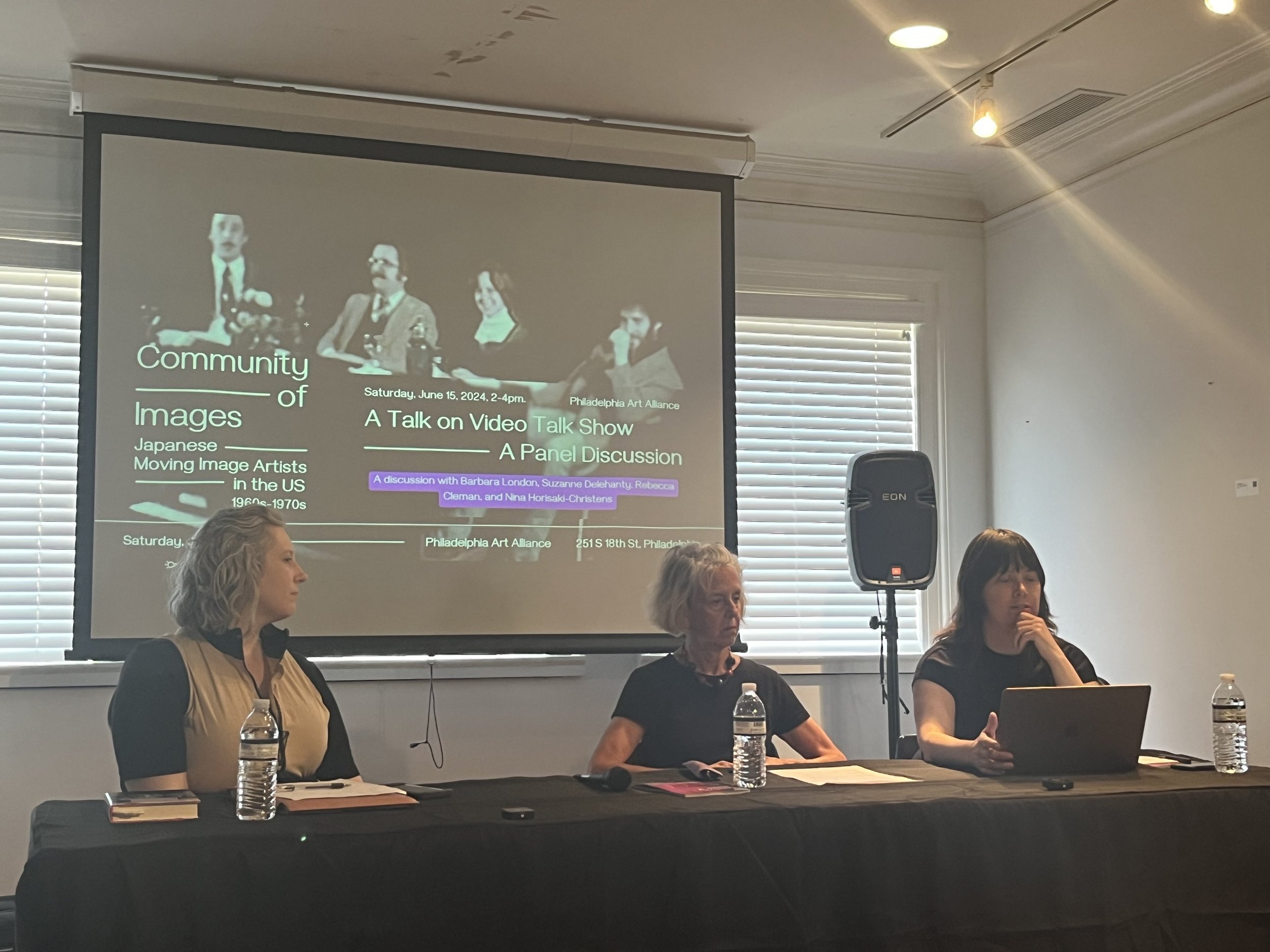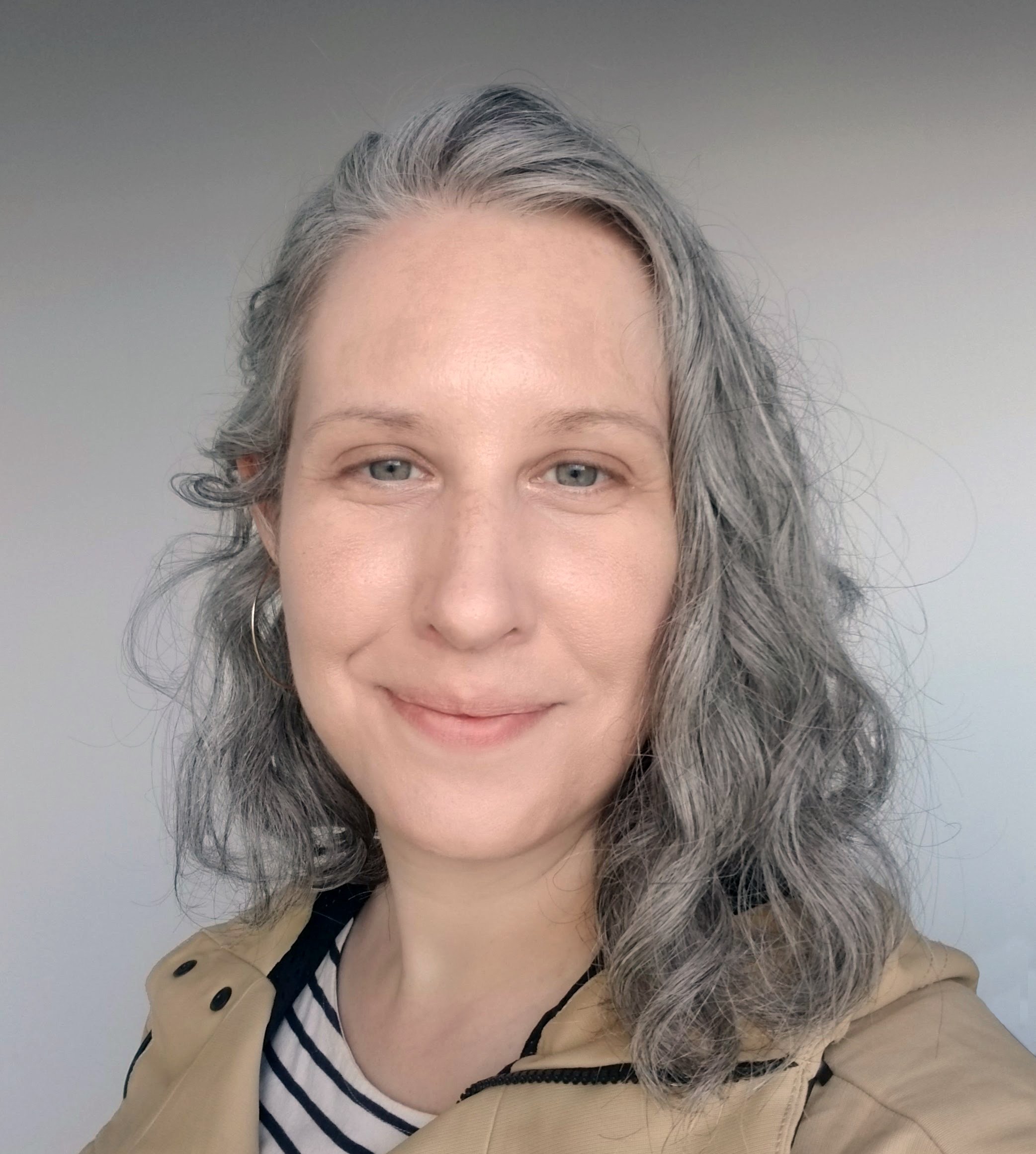A Talk on the Video Talk Show
A Panel Discussion
An event co-organized by the Shigeko Kubota Video Art Foundation and Collaborative Cataloging Japan, with speakers Barbara London, Suzanne Delehanty, Rebecca Cleman, and Nina Horisaki-Christens, the discussion revolved around the Video Art Talk Shows, a program series organized by Shigeko Kubota at the Anthology Film Archives in the mid-1970s. In the Community of Images exhibition, documentation of two events were digitized and will be presented.
We are thrilled to welcome two of the original guests—curators Barbara London and Suzanne Delehanty—who will be in conversation with Rebecca Cleman, Executive Director. and Nina Horisaki-Christens, scholar specializing in circulation of video art of the 1970s.
In 1974 Kubota founded the video program at Anthology Film Archives at the request of Jonas Mekas. From 1974 to 1982 she served as Anthology’s first Video Curator, where she played an instrumental role in showcasing emerging video art. In 1974, the same year Kubota took on this curatorial role, The Museum of Modern Art held the Open Circuits: An International Conference on the Future of Television conference. Organized in response to an increasing resistance to video art by the museum’s community, the conference sought to present an international perspective on the vibrant experimentation happening in this new medium; Kubota was enlisted to present on women’s contributions to the field. Alongside her curatorial work at Anthology, Kubota organized Video Talk Shows, a forum for discussion, starting in 1976. The series serves today as a window into video art’s development in New York from the mid-1970s through the early 1980s. Early in the series, the most urgent topic was the impact of the emergence of video on the film-dominated field of moving-image production, with participants musing on video’s future direction. The theme of the December 1977 Video Talk Show was “The Future of Video”—an examination of the state of video within museum institutions, which were represented by speakers on staff at MoMA, the Whitney Museum, and the University Art Museum at UC Berkeley. By the early 1980s, however, the series’ themes were primarily dedicated to the economics of producing video art and formal and aesthetic directions for video (themes included “Economics and Video Art: Problems and Opportunities” moderated by Jaime Davidovitch, July 28, 1981; “Video Editing and Video Animation Workshop,” April 17, 1983; “Video and Photography,” January 16, 1982). A total of three Video Talk Shows have been digitized by the Shigeko Kubota Video Art Foundation to date, from which we will present the opening remarks of two events (March 1977 and December 1977 events):
May 22, 1976, with David Ross and Hollis Frampton
March 23, 1977, with Suzanne Delehanty and Gerald O'Grady
December 18, 1977, with David Ross, Barbara London, John Hanhardt, and Jonathan Price
This program is co-organized by the Shigeko Kubota Video Art Foundation, and Collaborative Cataloging Japan.
Rebecca Cleman is the Executive Director of Electronic Arts Intermix (EAI), a leading nonprofit resource that has fostered the creation, exhibition, distribution and preservation of media art since 1971. EAI’s catalogue of nearly 5000 titles by over 200 artists is one of the most important collections of video and media art in the world. With Rachel Churner and Tyler Maxin, Cleman is the co-editor of The New Television/Video After Television, forthcoming from no place press in Fall 2024.
Suzanne Delehanty is the curator of the 1975 Video Art exhibition at the Institute of Contemporary Art, where she was its Director from 1971 through 1978. Currently, her consultant firm, SUZANNE DELEHANTY LLC provides provides strategic planning and art advisory services for initiatives that bring art, artists, and communities together. Founded in 2006, the firm serves an international roster of clients, including museums, foundations, government agencies, and other nonprofit organizations as well artists’ estates, individuals, and corporations.
Nina Horisaki-Christens is a 2023-24 Postdoctoral Fellow at the Getty Research Institute and received her Ph.D. from the Department of Art History and Archaeology and the Institute for Comparative Literature and Society at Columbia University in 2021. She received her Ph.D. from the Department of Art History and Archaeology and the Institute for Comparative Literature and Society at Columbia University in 2021. Her research focuses on the intersection of art, media, urbanism, translation, and social engagement in Japan, Asia, and the Asian diaspora. She was a summer 2023 Anne van Biema Fellow at the National Museum of Asian Art, a 2023 participant in the Global Asias Summer Institute at Penn State, a 2021-23 Burke Postdoctoral Teaching Fellow at Columbia University, a 2017-18 Fulbright Graduate Fellow based at Sophia University in Tokyo, and a 2012-13 Helena Rubinstein Curatorial Fellow at the Whitney Independent Study Program. Her curatorial work includes assisting with the Japan Society's 2019 exhibition "Made in Tokyo: Architecture & Living, 1964/2020," serving as Research Assistant for "Gutai: Splendid Playground" at the Guggenheim Museum, and working as Assistant Curator and Interim Programs Manager at Art in General.
Barbara London is a curator and writer with a practice that revolves around media, installation, and sound art produced internationally. Recent projects include Perpetual Motion, curated for the Perez Museum, 2024; the survey exhibition “Dara Birnbaum,” curated for the Prada Foundation, Milan (2023); the exhibition Seeing Sound (Independent Curators International, 2020-26); the podcast series, “Barbara London Calling,” 2020-2025; and Video Art: The First Fifty Years, published by Phaidon in 2020/2024.
London joined the curatorial staff at The Museum of Modern Art in the early 1970s, where she founded the video exhibition and collection programs. While at MoMA, she organized numerous media exhibitions and one-person shows, and led the acquisition of works by such artists as Laurie Anderson, Nam June Paik, Sondra Perry, Zhang Peili, among many others. Her thematic shows included “Soundings: A Contemporary Score,” “Music Video: The Industry and Its Fringes,” “Looking at Music,” and “Video from Tokyo to Fukui and Kyoto.” Her writing has appeared in numerous catalogues and publications. She was the first to integrate the Internet as part of curatorial practice, with Stir-fry (1994), http://www.adaweb.com/context/stir-fry/; Internyet (1998); and dot.jp. (1999.) She has taught in the Sound Art Department at Columbia University, and in the Graduate Art Department at Yale, from 2014-2019. Read full bio: About – BARBARA LONDON
Community of Images: Japanese Moving Image Artists in the US, 1960s - 1970s
Community of Images: Japanese Moving Image Artists in the US, 1960s-1970s will be an exhibition of experimental moving images created by Japanese artists in the U.S. during the 1960s and 70s, an area that has fallen in the fissure between American and Japanese archival priorities.
This project is co-presented by Collaborative Cataloging Japan and the Japan America Society of Greater Philadelphia in partnership with Philadelphia Art Alliance at University of the Arts. Major support for the Community of Images exhibition has been provided by The Pew Center for Arts & Heritage, with additional support from the Andy Warhol Foundation, the Toshiba International Foundation, Pola Art Foundation, the Pennsylvania Council on the Arts, Philadelphia Cultural Fund, and the Japan Foundation.







